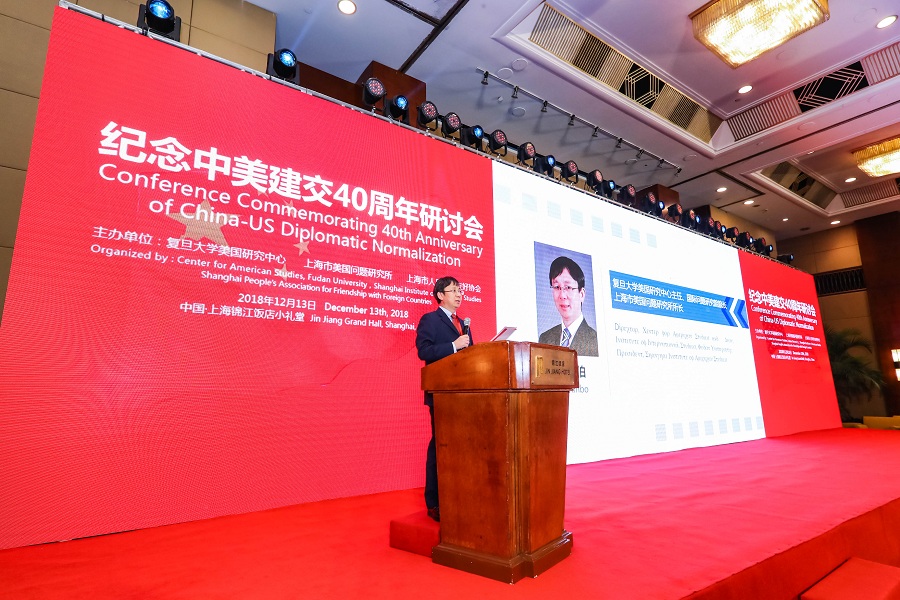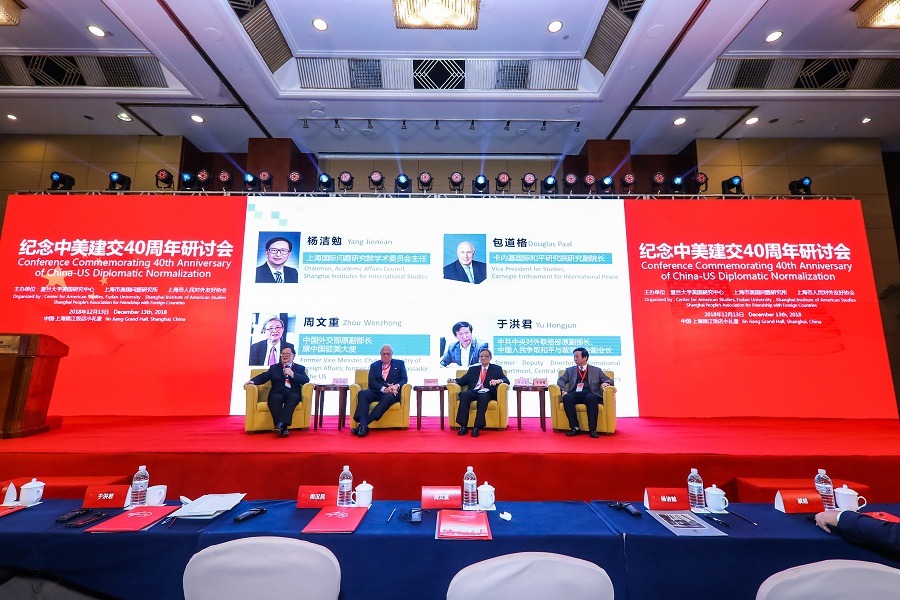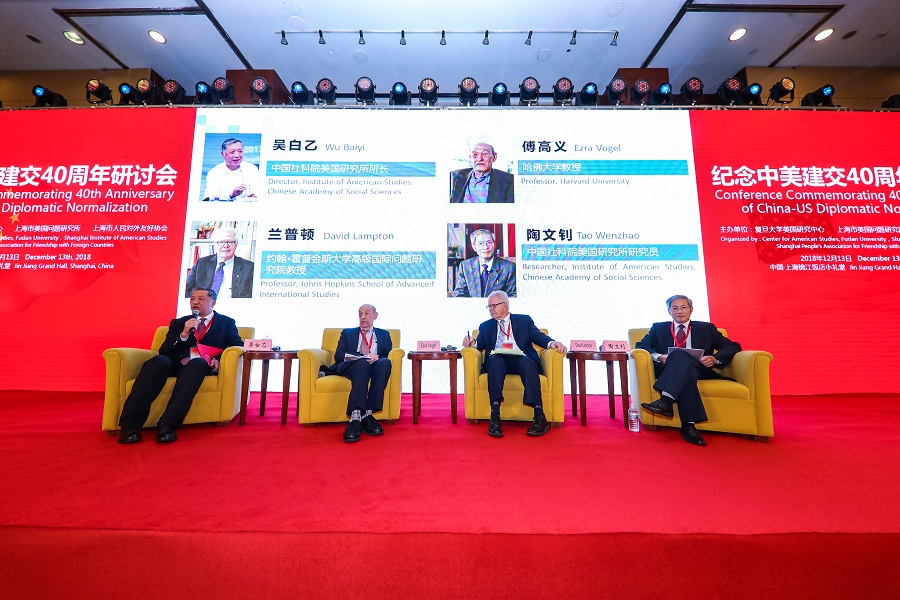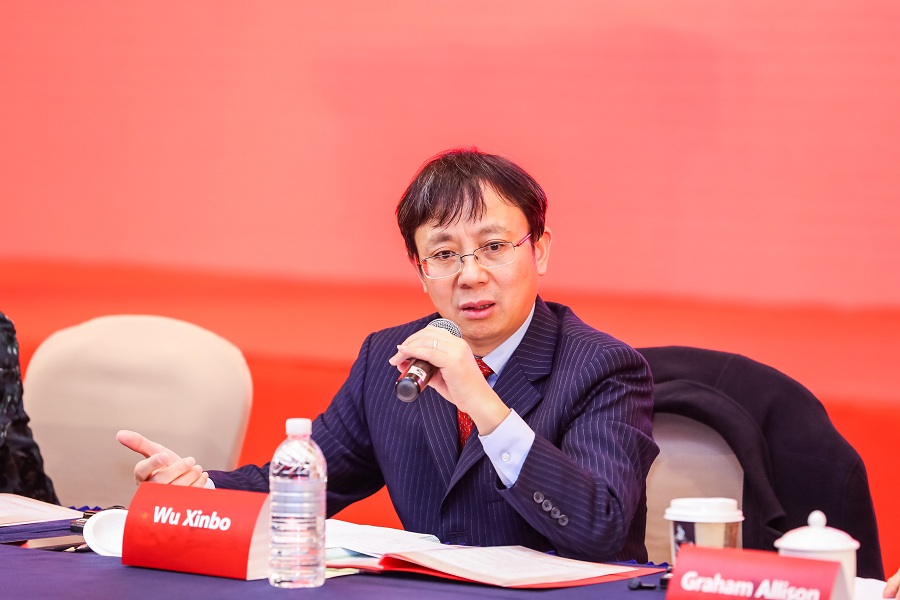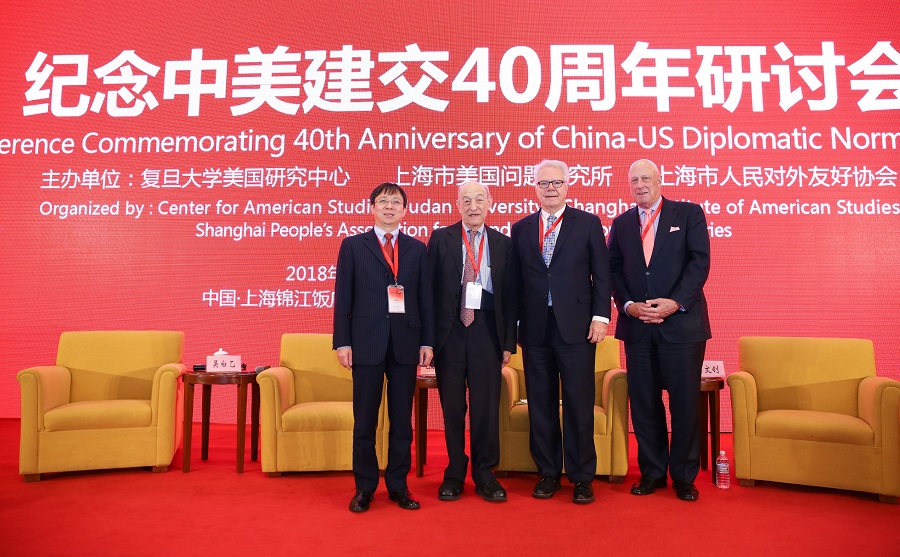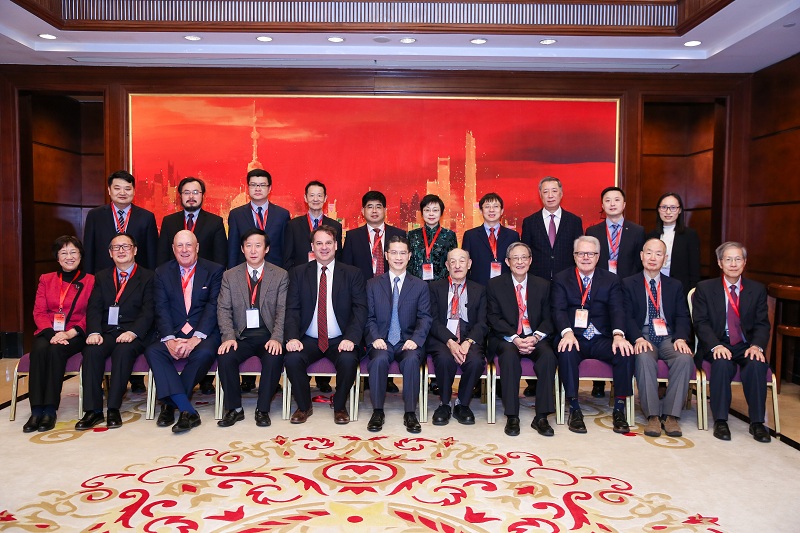
On December 13th, 2018, co-organized by the Center for American Studies at Fudan University, Shanghai Institute of American Studies and Shanghai People’s Association for Friendship with Foreign Countries, the Conference Commemorating the 40th Anniversary of China-U.S. Diplomatic Normalization was ceremoniously held in Shanghai. Around 200 delegates in academic, diplomatic circles, including renowned scholars, veteran diplomats and distinguished guests from all walks of life gathered at Jin Jiang Hotel, a commemorative site of special historic significance, to share dialogues on the history, present and future of Sino-U.S. relations.
In the Plenary Welcome Session, Professor Wu Xinbo, Director of the Center for American Studies and Dean of the Institute of International Studies at Fudan University; President, Shanghai Institute of American Studies addressed the opening remarks. Professor Wu noted that it was in the Jin Jiang Grand Hall, the birthplace of Sino-U.S. relations, where then-U.S. president Richard Nixon signed the Shanghai Communiqué, also known as the Joint Communique of the United States of America and the People's Republic of China with Premier Zhou Enlai. The issuance of the Shanghai Communiqué signaled the new chapter of normalizing relations between China and the United States. Over the past 40 years, the international situation has undergone tremendous changes and China has taken on a brand-new development landscape from the spots, with unprecedented giant strides proceeding in Sino-U.S. relations. On the occasion of the forthcoming 40th Anniversary of the establishment of diplomatic relations between China and the United States of America, the greatest confusion we face is "Whither Sino-U.S. Relations?". The initiative to convene the specifically meaningful conference at the time node consists in the reality-oriented significance to foster the development of China-U.S. ties by reviewing the 40-year history of bilateral relations, reflecting on the challenges at present and looking ahead into the orientations of the future.
At the Opening Ceremony, Mr. Zhou Hanmin, the Standing Committee Member of Chinese People's Political Consultative Conference(CPPCC), Vice Chairman of China National Democratic Construction Association (CNDCA), Vice Chairman of the 13th Shanghai Committee of the Chinese People's Political Consultative Conference (CPPCC), Chairman of Shanghai Committee of CNDCA, Mr.Xie Chao,Member of the Party Leadership Group, Vice President and Secretary General of Shanghai Federation of Social Science Associations, Ms. Jing Ying, Deputy Inspector of Foreign Affairs Office of the Shanghai Municipal People’s Government and Mr. Sean B. Stein,American Consul General in Shanghai, addressed the Session, fully affirming the outstanding accomplishments scored in China-U.S. relations over the past four decades with regard that the progress of bilateral ties between China and the U.S. in complementarily synchronous initiation with China’s reform and opening-up process is not an incidental but a historically inevitable result.
Following the ceremony, the scholars and experts from China and the U.S. conducted academic exchanges and exploration into the four broad themes: "In Retrospect of 40 Years of Sino-U.S. Relations: Diplomacy Legends", "In Retrospect of 40 Years of Sino-U.S. Relations: Academia Observation", "Current Sino-U.S. Relations: Challenges and Opportunities", and "Sino-U.S. Relations in the Next Four Decades". The panelists reached the consensus that the dramatic and rapidly evolving global situation over the past four decades led to the transformation of the international political environment and balance of power between both sides, we would still be capable of coming up with the constant fundamentals to maintain the evolution of China-U.S. relations .
Meanwhile, the strategic essentials of Sino-U.S. relations reflect no changes: How well we manage the bilateral relations allows a response to regional circumstances and directly influences the settlement of numerous global issues.
The fact that cooperation generates benefits for China and the U.S. remains unchanged: The success of China’s reform and opening-up policy and America’s identity as the superpower, to a certain extent, benefits from the mutual support,collaboration and strategic partnership. Likewise, U. S. economic prosperity would not have been spurred without the generous contributions of Chinese merchandise market.
To that end, the ongoing stability and necessity of Sino-U.S. relations to keep pace with the times substantiates that in the ever-changing situations of both sides and the global context as a whole, we constantly adapt to domestic and external circumstances, innovate to energize the mode of thinking to foster the bilateral relations in propulsion rather than evolve back towards the retrogressive periods.
The delegates present at the conference conveyed profoundly in-depth reflections that as the largest developing and developed countries and the world's first and second largest economies, the vast dimension and rich connotation of China-U.S.relations denotes and entails the breadth of mind, profundity of wisdom as well as the grandeur of landscapes from both sides. The wealthy accumulation of successful initiatives brings forth positive and beneficial inspiration, motivating both sides to seek common interests and strengthen inter-dependence continuously in the course of reshaping patterns of interaction, advancing scopes of collaboration, exploring brand-new forms of cooperation as well as developing multiple "stabilizers" and "anchors", shelving and resolving differences with a dialectical view while competing in a constructively-structured manner for the common progress forged by the benign competition.
Mr. Zhou Wenzhong, former Chinese Ambassador to the U.S. and former Vice Minister of Foreign Affairs of the People’s Republic of China, and Mr. Yu Hongjun, former Vice Minister of the International Liaison Department of the Central Committee of the CPC, together with prestigious scholars and experts from China and the U.S.: Yang Jiemia, Tao Wenzhao,Ezra Feivel Vogel, David Lampton, Douglas Paal, Graham Allison, Yang Yi, Yao Yunzhu, He Weiwen, Ken Jarrett,Wu Baiyi, Chen Dongxiao and Da Wei shared and exchanged viewpoints respectively.To conclude, Professor Wu Xinbo delivered the closing remarks accordingly.
Furthermore, presented as one of the highlighted items on the agenda, the Center for American Studies at Fudan University, the Shanghai Institute of American Studies, together with The Paper (a Chinese digital media outlet), launch "40 People on 40 Years: An Interview Series Commemorating the 40th Anniversary of China-U.S. Diplomatic Normalization", a project which features exclusive interviews with 40 renowned experts (20 from each side) in seven cities across China and the United States, aiming at closely tracing and pursuing the diplomatic paths of both sides, tapping into the potential to strengthen mutual understanding and enhance collaboration with shared insightful perspectives.
